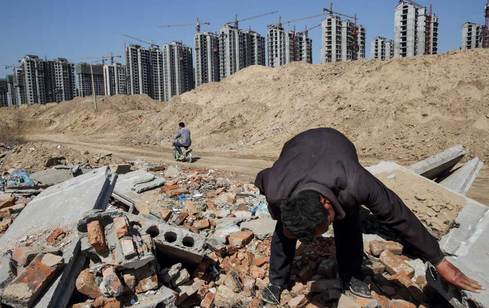
HAVE YOU WONDERED ABOUT THE 'GHOST CITIES' IN CHINA? YOU'RE LOOKING AT SMART GROWTH, CHINA-STYLE. COMING TO YOUR TOWN SOON--OR IS IT THERE ALREADY? THE CHINESE HAVE IT EASY--THEY CAN JUST DEMOLISH YOUR CITY AND MOVE YOU FORCIBLY INTO SMART GROWTH. WAIT FOR IT. OR FIGHT IT NOW.
ttp://www.nytimes.com/2013/06/16/world/asia/chinas-great-uprooting-moving-250-million-into-cities.html?pagewanted=all&_r=0
BEJING China is pushing ahead with a sweeping plan to move 250 million
rural residents into newly constructed towns and cities over the next dozen
years a transformative event that could set off a new wave of growth or
saddle the country with problems for generations to come.
The government, often by fiat, is replacing small rural homes with high-rises,
paving over vast swaths of farmland and drastically altering the lives of rural
dwellers. So large is the scale that the number of brand-new Chinese city
dwellers will approach the total urban population of the United States in
a country already bursting with megacities. The costs of this top-down approach can be steep. In one survey by Landesa in 2011, 43 percent of Chinese villagers said government officials had taken or tried to take their land. That is up from 29 percent in a 2008 survey.
“In a lot of cases in China, urbanization is the process of local government driving farmers into buildings while grabbing their land,” said Li Dun, a professor of public policy at Tsinghua University in Beijing.
Farmers are often unwilling to leave the land because of the lack of job
opportunities in the new towns. Working in a factory is sometimes an option, but most jobs are far from the newly built towns. And even if farmers do get jobs in factories, most lose them when they hit age 45 or 50, since employers generally want younger, nimbler workers.
“For old people like us, there’s nothing to do anymore,” said He Shifang, 45, a farmer from the city of Ankang in Shaanxi
Province who was relocated from her family’s farm in the mountains. “Up in the mountains we worked all the time. We had pigs and chickens. Here we just sit around and people play mah-jongg.”
On the ground, however, the new wave of urbanization is well under way. Almost every province has large-scale programs to move farmers into housing towers, with the farmers’ plots then given to corporations or municipalities to manage. Efforts have been made to improve the attractiveness of urban life, but the farmers caught up in the programs typically have no choice but to leave their land.
Top-down efforts to quickly transform entire societies have often come to grief, and urbanization has already proven one of the most wrenching changes in China’s 35 years of economic transition. Land disputes account for thousands of protests each year, including dozens of cases in recent years in which people have set themselves aflame rather than relocate.
READ THE REST OF THE NEW YORK TIMES ARTICLE
 RSS Feed
RSS Feed